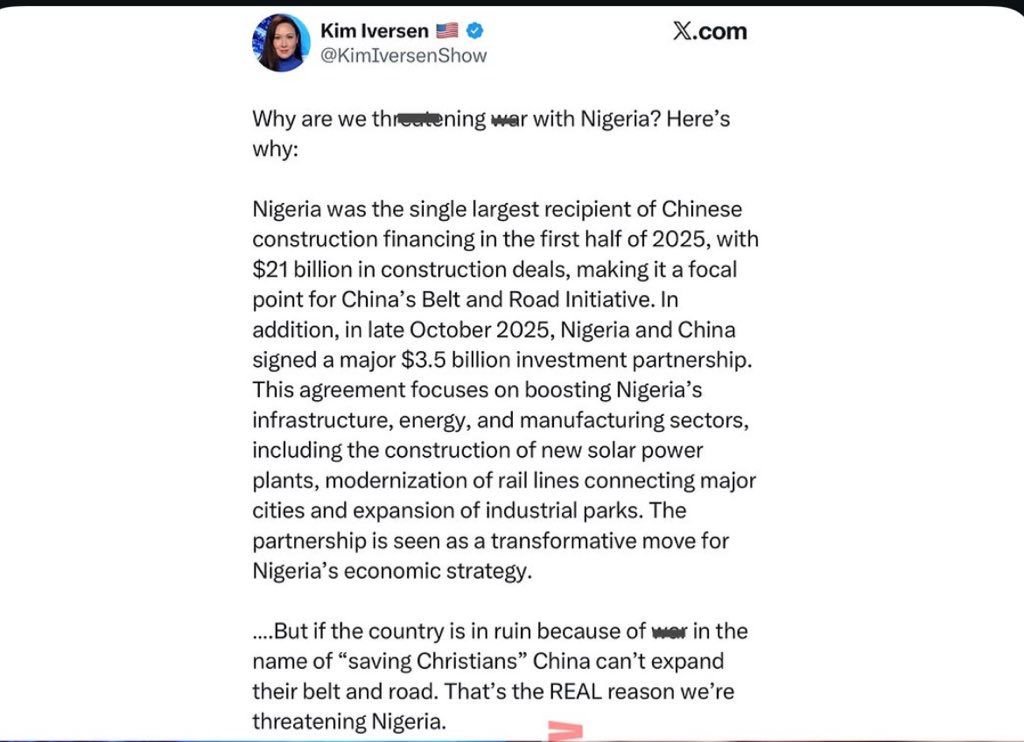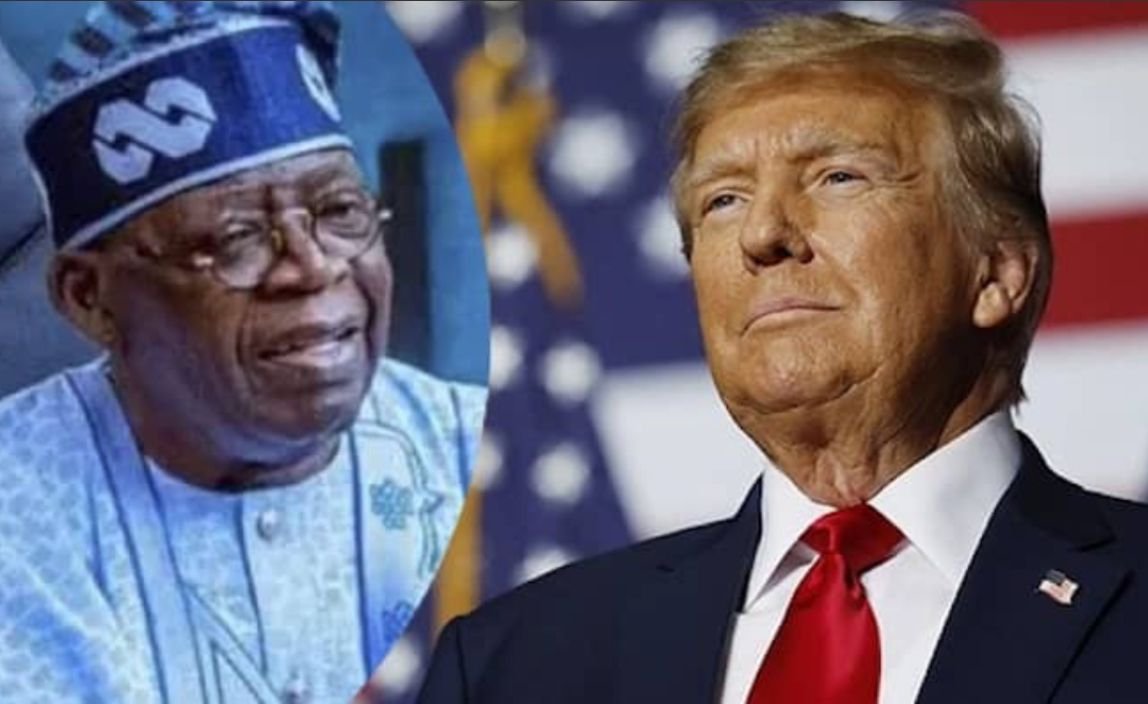When the United States reintroduced Nigeria as a “Country of Particular Concern” (CPC) and instructed Pentagon planners to “prepare to intervene,” the reaction in Abuja was swift and furious. What might have seemed like a local security issue, attacks on Christian communities suddenly became a flashpoint on the global stage. Suddenly, Nigeria was at the intersection of geopolitics, economic ambitions, and moral posturing, with powerful international players staking claims over the country’s future. Council on Foreign Relations+3ABC News+3Vanguard News+3
The U.S. move has reverberated far beyond religious headlines, raising questions about sovereignty, influence, and the enormous economic prizes at stake: Chinese infrastructure deals, untapped mineral resources in northern Nigeria, and the meteoric rise of Aliko Dangote’s energy empire.
Two Camps, One Tense Stage
Team U.S. Hardliners
Evangelical groups, conservative lawmakers, and some policy commentators in America have been vocal about the need for tough action against Nigeria. Their narrative frames the violence in some regions as a deliberate, religiously-motivated persecution of Christians…a cause that resonates deeply with U.S. domestic politics. AP News+1
Team Nigeria and Global Allies
Abuja insists the violence is far more complex: a mixture of insurgency, banditry, communal clashes over resources, and criminal activity not a state-led campaign against Christians. Nigeria has welcomed foreign assistance but strictly on terms that preserve sovereignty.
China, a major economic partner, has cautioned against using “human rights” as a pretext for interference, signaling a protective stance over its growing investments. Meanwhile, the European Union and many African governments favor multilateral, non-military solutions such as peace-building, capacity strengthening, and intelligence sharing.
Why Everyone Cares
For the U.S., this is a mix of moral posturing, domestic political leverage, and influence over a strategically vital African nation.
For China and the EU, it’s about safeguarding investments, protecting influence, and avoiding dangerous precedents of unilateral military intervention.
For Nigeria, the priority is clear: maintain sovereignty and control over security strategies.
The Internet Goes Wild: Minerals, Refineries, and Rumors
A viral screenshot from American commentator Kim Iversen intensified the debate, suggesting that U.S. pressure on Nigeria is partly about blocking China’s Belt & Road investments in Nigeria, pointing to big Chinese construction financing and a $3.5 billion investment pact. (Note: exact figure pending verification.)

Two other rumors dominate Nigerian social media:
Northern minerals: Whispers persist that foreign powers may covet nascent mineral finds in northern Nigeria. While there’s no public evidence, the theory aligns with common suspicions about resource extraction.
Dangote’s refinery: Africa’s largest private refinery could make Nigeria more energy-independent, which some speculate may make foreign actors nervous. Destabilizing narratives, analysts warn, could slow foreign investment or shift leverage away from domestic champions.
Together, these whispers have shifted the conversation from religion to geopolitics and money, raising the stakes far beyond the headlines.
How Nigeria Feels the Heat
Diplomatic strain: Abuja rejects labels of religious persecution while seeking EU and Chinese support, carefully balancing security needs with sovereignty.
Investor nervousness: Risk premiums rise, and banks may pause new deals as uncertainty grows.
Domestic politics: The CPC designation is weaponized government elites rally around sovereignty, while opposition and civil society press for accountability.
Security chill: Even routine intelligence and training programmes could slow, affecting counter-insurgency operations.
Regional ripples: For example, Chad reportedly closed its border with Nigeria over U.S. military concerns, a sign that regional stability is already affected. ABC News+1
Measures Already in Place
United States:
CPC designation reintroduced for Nigeria. ABC News+1
Legislative push by Ted Cruz to hold Nigerian officials accountable and impose sanctions. cruz.senate.gov+1
Revocation of over 80,000 visas for Nigerians and others as part of broader enforcement. Businessday NG+1
Pentagon contingency planning and threat of withholding aid.
Nigeria:
Willingness to partner on security, but under strict terms.
Ongoing domestic counter-insurgency operations.
Diplomatic outreach to China, the EU, and others to secure political support and shape narrative.
If the U.S. Intervenes: Possible Scenarios
Why now? Years of mixed Nigerian security performance, combined with strategic competition over Chinese investments and domestic political leverage, have created a perceived window for U.S. action.
Scenarios:
Light: Intelligence sharing, logistics support, and increased training least escalatory.
Medium: Drone strikes on militant camps higher risk, potential collateral damage.
Heavy: Aircraft carrier deployment and fighter-bombers in northern Nigeria… a major escalation with long-term consequences.
Potential outcomes:
Positive: Rapid disruption of extremist networks, operational improvements, symbolic deterrence.
Negative: Loss of sovereignty, civil backlash, diplomatic strain with China/EU, dependence on foreign military, and weakened local institutions. Analysts caution that “military action alone cannot solve Nigeria’s crisis.”
Council on Foreign Relations
Voices from Within Nigeria
Government elites label the CPC move as foreign interference. Council on Foreign Relations
Separatist groups like Indigenous People of Biafra (IPOB) pleldged support for more aggressive U.S. action.
Faith & civil-society leaders vary in response some welcome external pressure; others stress addressing root causes like climate, governance, and land disputes.
Everyday citizens are caught between nationalism, suspicion of foreign motives, and frustration over insecurity.
The Stakes
Nigeria faces a stark choice: bow to U.S. pressure at the risk of losing autonomy, or resist and risk sanctions and isolation.
For the U.S., success could enhance moral leadership and geopolitical influence; failure could undermine its Africa strategy.
China and the EU are watching closely, signaling their intent to limit Western military footprints and safeguard economic engagements.
For Nigerians, the risk is real: foreign intervention, economic disruption, or worsening insecurity if the underlying issues remain unresolved.
“When two elephants fight, the grass suffers.”
Here, the grass is Nigeria’s citizens and if the struggle continues unchecked, the terrain of the nation will be irreversibly reshaped.
Like this content , click here to read more
















